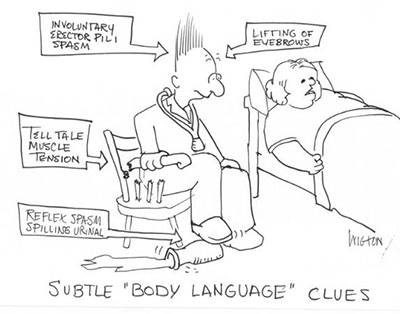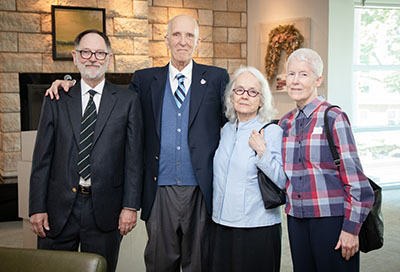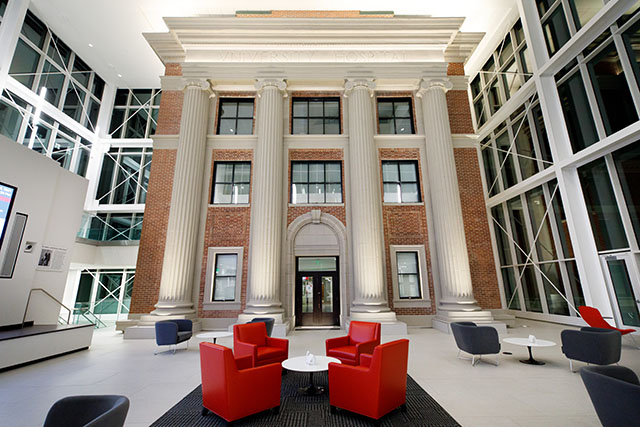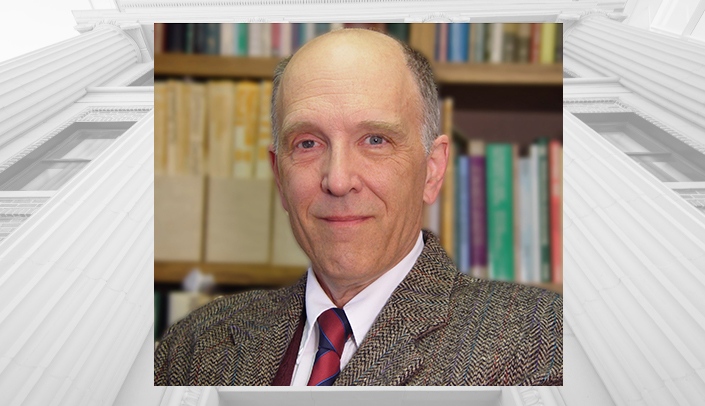Robert Wigton, MD, longtime leader at UNMC, died Monday, Aug. 22. Working with Dr. Wigton before his death, Erin Torell and members of the McGoogan Health Sciences Library produced this history piece on Dr. Wigton — a fitting way, Dr. Wigton told library staff, to mark the passing of the university’s unofficial historian.
Robert Wigton, MD, a man of many interests and talents, leaves a mark on UNMC both in his role in improving medical student education and as a curator of UNMC history.
Dr. Wigton was born into an Omaha medical family. His grandfather Harrison Wigton, MD (COM graduate 1904), practiced psychiatry in Omaha and was a member of the College of Medicine Department of Neurology and Psychiatry. Dr. Wigton’s father, Robert Spencer Wigton, MD (COM graduate 1935), joined his father’s private psychiatric practice and the College of Medicine Department of Neurology and Psychiatry. Dr. Wigton followed in his family’s footsteps, earning his MD from UNMC in 1969. But he broke with family tradition by pursuing internal medicine. After completing his residency at UNMC, Dr. Wigton joined the faculty in general internal medicine. In 1972, he received an MS in physiology from UNMC.
See the library’s online exhibit on Dr. Wigton and his family.
 |
| Dr. Wigton was an accomplished artist, often illustrating his conference announcements and in 2014 holding an exhibit of his oil paintings and photographs. The above cartoon was part of a series he created on “bedside manner.” More illustrations can be found at the link above. |
Dr. Wigton devoted more than 40 years to improving the educational experience for medical students at UNMC through innovations in medical decision-making. In 1982, he was a visiting scholar at the University of Pennsylvania to research decision-making in clinical settings. He subsequently developed a “programmed learning” curriculum that encouraged students to reason through standardized patient diagnoses to allow them to see their effect on a particular situation. It was a “choose your adventure” exercise: using a multi-question process, students would evaluate a path to take at each step. Every correct answer would lead students to the next question. An incorrect answer would lead to an explanation of why the choice was wrong and move the student back to the beginning of the diagnosis process.
Memorial service
A memorial service will happen later this fall at the Wigton Heritage Center. Information will be shared with the campus community when available.
This process enabled Dr. Wigton’s students to make their own choices on cases and learn from their mistakes in a supportive, educational environment. Dr. Wigton’s work in the classroom and studies in medical decision-making led him to publish more than 160 scientific papers and book chapters on the topic, in addition to studies on computer-based teaching programs. Dr. Wigton served as vice-president and board member of the Society for Medical Decision Making (SMDM). In 1996 the society awarded him the Eugene Saenger Award for Distinguished Service to SMDM.
Dr. Wigton was a Renaissance man who had many interests beyond medicine. He was a jazz musician, playing the saxophone and clarinet in several jazz bands while attending Central High School. He attended Harvard College and received a BA in English literature. From 1966-1969, while he was in medical school, Dr. Wigton taught a cinematography course at Creighton University. His filmmaking skills led him to assist UNMC faculty in creating instructional material and his classmates in creating entertaining films highlighting humor and joy in medical education. Dr. Wigton also was an accomplished artist. During his residency and as a faculty member, he used his drawing skills to create training materials and announce presentations. Later in his career, Dr. Wigton exhibited oil and watercolor paintings and photography at several local galleries. His interest in science fiction dovetailed into his professional interest in computers and decision-making.
 |
| From left, family members James Wigton, MD, Robert Wigton, MD, Judith Wigton and Deborah Wigton gather following the groundbreaking ceremony for the Wigton Heritage Center in 2019. |
Given his family’s long history in Omaha medicine and at UNMC, it was only natural that Dr. Wigton would become the “unofficial historian” for the campus. His interest led to campus presentations and UNMC Today photo challenges on the history of UNMC and Nebraska medical history. Dr. Wigton generously collaborated on numerous projects with the McGoogan Library Special Collections and Archives Department (SCA) including:
- Digitization of historic photographs
- Financial support for an interactive touchscreen displaying digital exhibits
- Financial support to purchase and install a custom art storage system
- Personally conducted numerous oral histories
- Leading the work to bring a Nebraska State Historical marker to Poynter Hall
In 2017, the McGoogan Library renamed Level 8 the Wigton History of Medicine Archives. The culmination of his love of sharing UNMC history was the creation of the Wigton Heritage Center, which opened in 2021. The Wigton Heritage Center memorializes UNMC’s unique history through exhibitions that utilize the collections of SCA and serves as the campus welcome center.
Dr. Wigton contributed to various professional organizations. He served on the Society for General Internal Medicine board, and in 2005 the society awarded him the Elnora Rhodes Award. As a member of the American College of Physicians, in 2006, he was awarded the Nebraska Chapter Laureate Award. Dr. Wigton was a fellow of the American College of Medical Informatics. As a member of the medical honor society, Alpha Omega Alpha, Dr. Wigton served as the society’s Nebraska Chapter counselor and past president. In 2007 the national Phi Rho Sigma awarded Dr. Wigton the Irving Cutter Award for his lifetime contribution to medicine.
During his long career at UNMC, Dr. Wigton held various positions.
- 1976-1979, Director of the House Officer Program for Internal Medicine
- 1986-1987, Interim Dean for Academic Affairs
- 1976-2013, Associate Dean for Graduate Medical Education
- 1993-2002, Chief of the section of General Internal Medicine
 |
| Longtime friend and colleague Thomas Tape, MD, called the Wigton Heritage Center “a fitting legacy to Bob’s enormous impact on UNMC.” |

We have lost a giant of a man….one of UNMC's greatest ambassadors. My deepest sympathies to the Wigton family and my thanks for all they did to make UNMC a world-class academic medical center. He will never be forgotten.
Dr. Wigton will be missed. I'll never forget him.
I first met Bob as a PhD student at the Society for Medical Decision Making meeting annual meeting in 2005 – he was in charge of the Lee Lusted Award for students for many years. I was delighted to learn that he was in Nebraska when I came here a couple years later and seeing him continually work to improve UNMC and more recently efforts within the library and new pavilion. He is missed and will not be forgotten.
Dr. Wigton was an outstanding mentor and friend. He was a key supporter of the 'new' emergency medicine residency program. We will miss him dearly.
Dr. Wigton became Academic Affairs Dean during my time at the UNCOM. His energy and devotion to medical education was evident 35+ years ago and continued during his long and storied UNMC career. In addition to his brilliance he was also kind and respectful of everyone around him. I will always remember him as a great physician and educator but also a wonderful human being.
Condolences to family and friends. Dr. Wigton will be missed by everyone at UNMC.
An amazing and thoughtful physician and gentleman. His unassuming but significant impact on nearly everything at UNMC will be felt long after he is gone. I was fortunate to have known him and interacted with him. He always had a thoughtful response to everything. He will be missed sorely but his legacy will be surrounding us for years to come. What an amazing person and career!
Somehow, in addition to all his other activities, he found time to make substantial contributions to research on physician judgment and decision making. He was a great friend and colleague.
I met Bob decades ago when I was a PhD student, and almost annually since, while we attended the Brunswik Society meetings. I have missed his thoughtful and gentle approach to getting across his constructive criticism of the research and ideas that was presented at these meetings – were the discussion could sometimes get quite heated. I am glad to have met him and learned from him.
Bob was a fixture at the annual meetings of the Brunswik Society. I always looked forward to seeing him, as his presence lent an added weightiness to the proceedings. He brought a certain seriousness leavened with joyfulness to the interactions. I liked and respected Bob. He was a good man.
Mike Doherty
I always enjoyed working with Bob. He was such a scholar and gentleman. He will be missed.
Bob was a very talented, kind, and sharing person. The Wigton Heritage Center is a fabulous legacy. Len Adelman
Bob Wigton was a year ahead of me at the COM (69, 70.) I do remember him, but never knew him well. However, in reading through his life story here, I believe his grandfather Harrison and my great-uncle Willis E. Talbot were classmates at the COM, graduating in 1904. It would have been neat to have known that back in the day. Jim
I knew him well in college. He was extraordinarily intelligent and also a nice guy. He was also an amazing musician